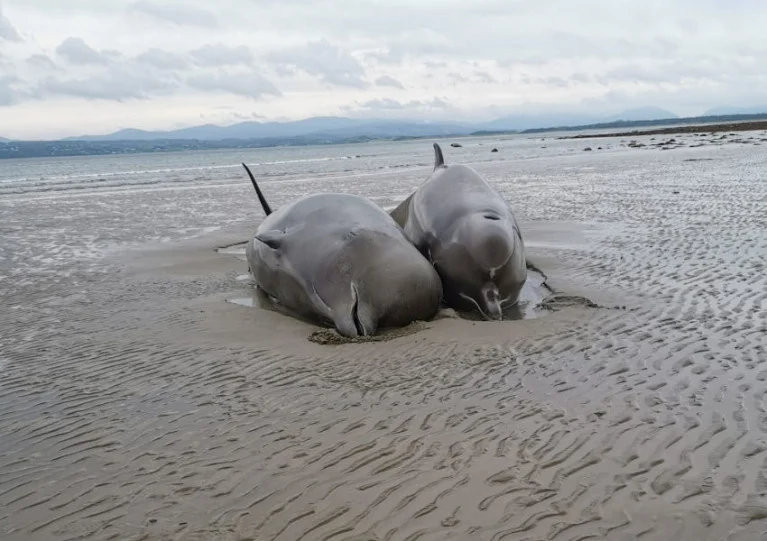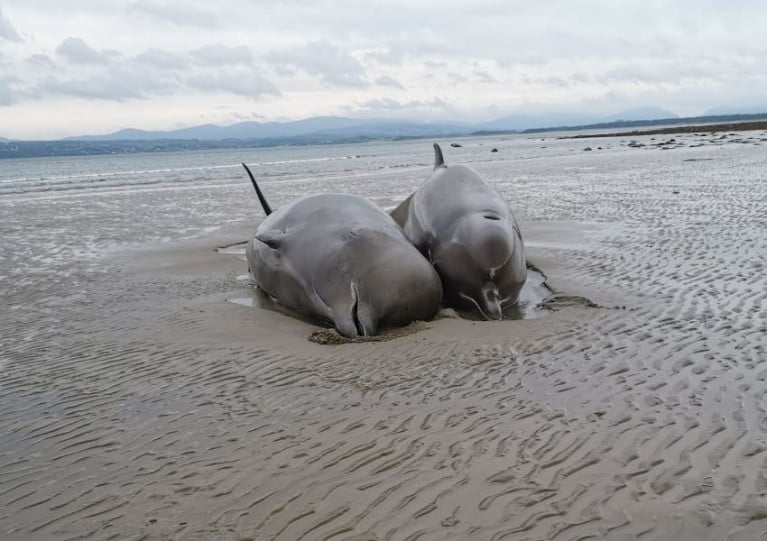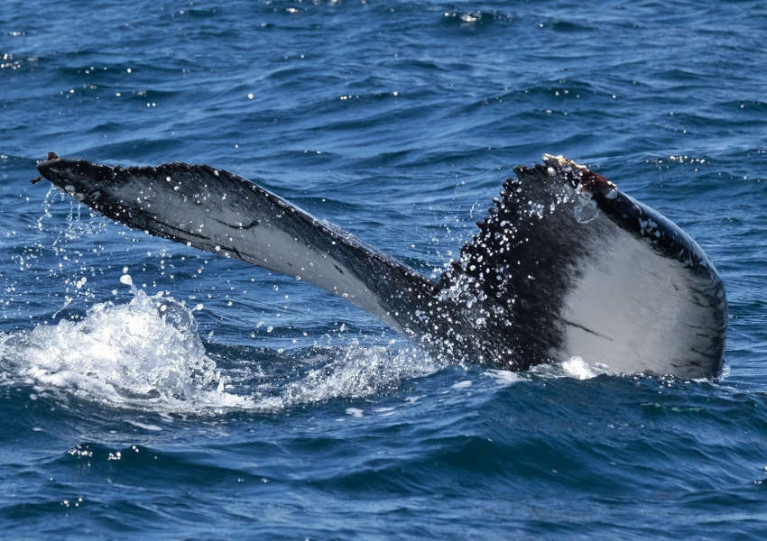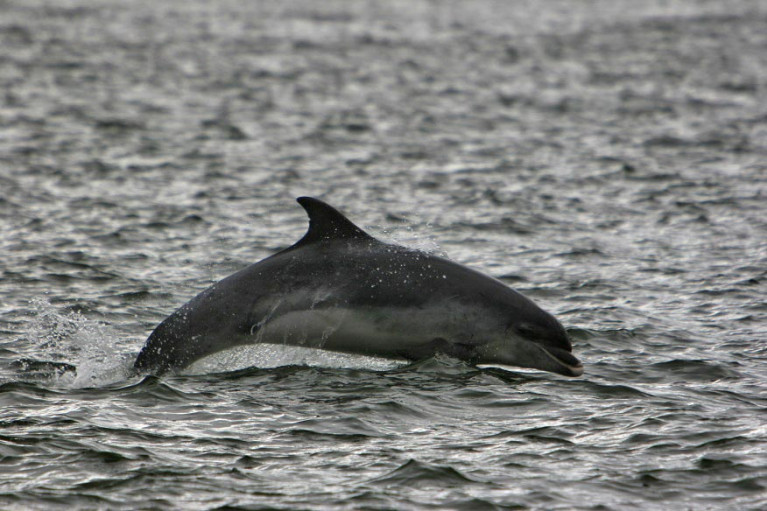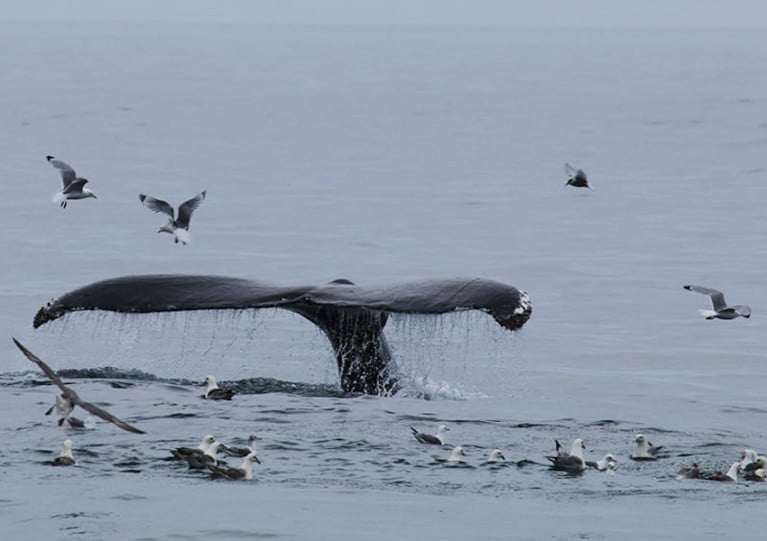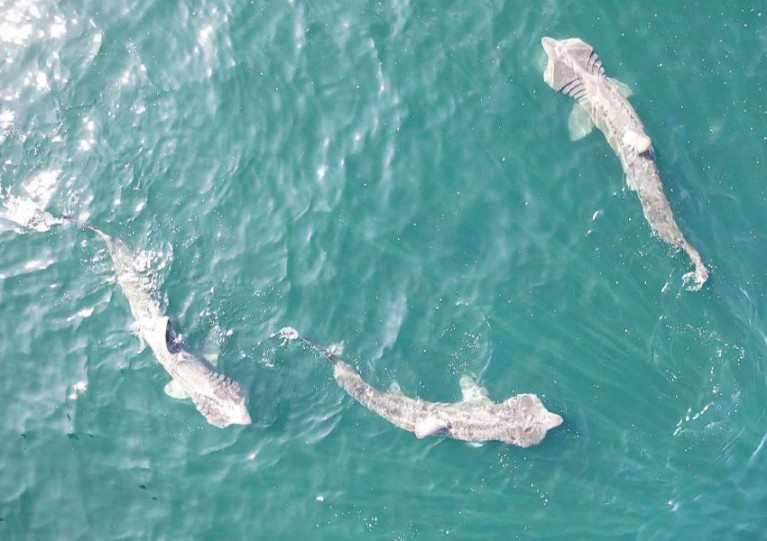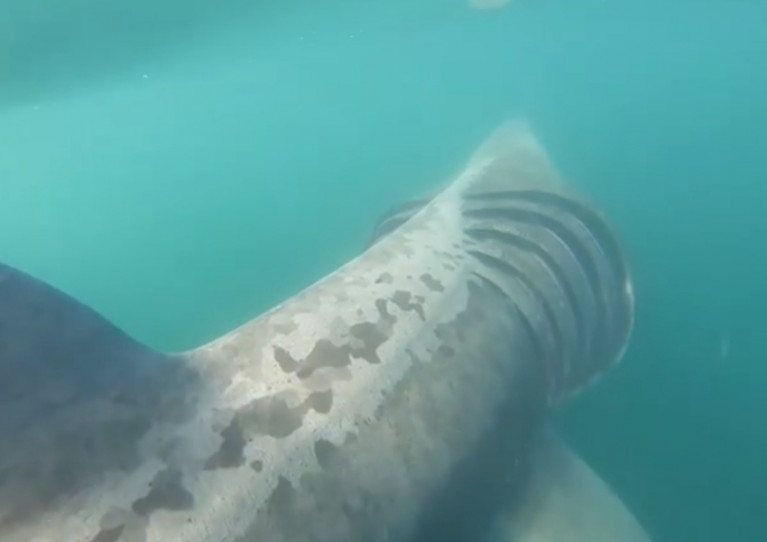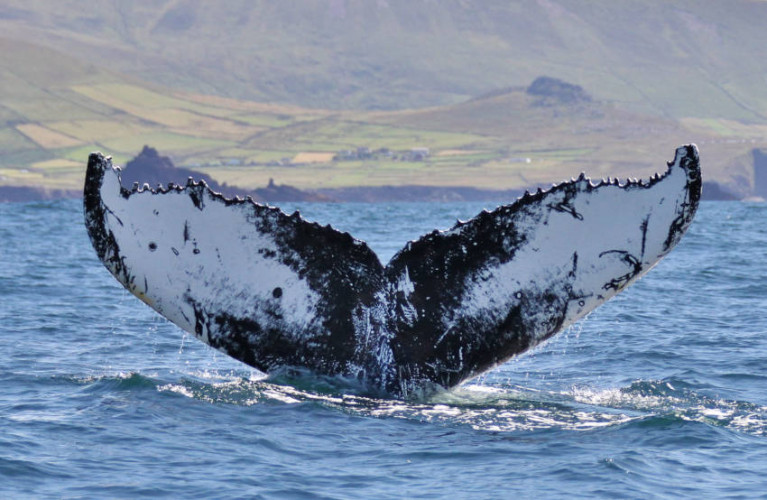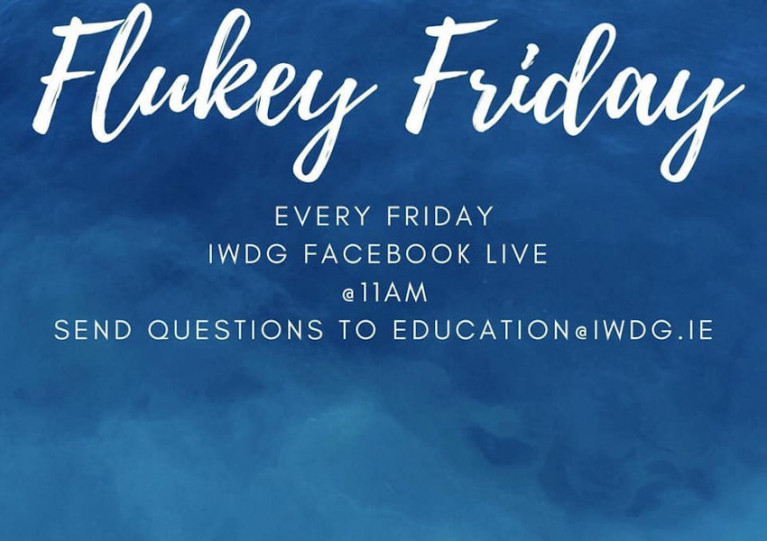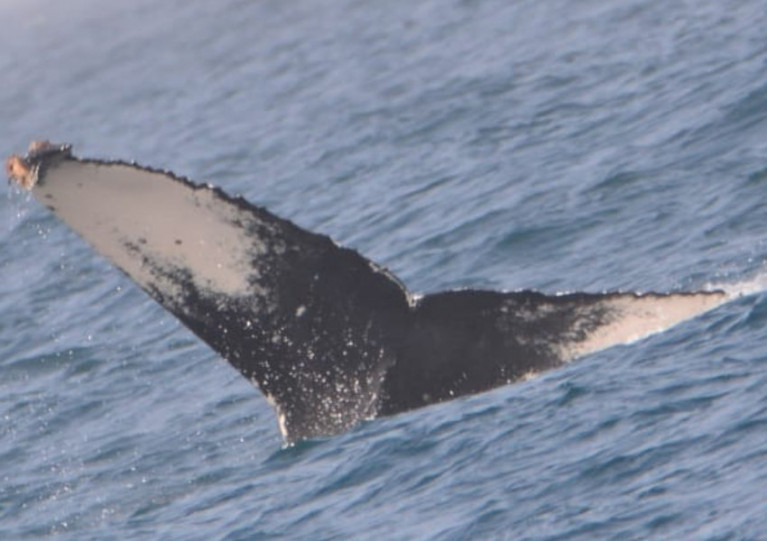Displaying items by tag: IWDG
The Army could be employed to euthanise beached whales and other marine wildlife that have no prospect of being refloated, the Irish Whale and Dolphin Group suggests in its draft protocol.
As the Irish Independent reports, the proposal is part of the charity’s push towards a more humane approach to whale strandings — a subject in focus since last week’s mass deaths of bottlenose whales in Co Donegal, the largest of its kind on record in Ireland.
Concerns were raised over crowds gathered on Rossnowlagh Beach last Wednesday (19 August) to take selfies or demand further rescue efforts, causing the animals additional distress in their final moments.
The IWDG’s chief Dr Simon Berrow said: “People are naturally curious and very well-meaning, but there was no possibility of refloating the whales, and we were trying to minimise their distress.”
Dr Berrow ruled out the use of drugs to euthanise stranded marine wildlife, but suggested that the Army could be trained for ‘humane shooting’ and called for inter-agency discussion of the matter.
The Irish Independent has more on the story HERE.
Seven Bottlenose Whales Die On Donegal Beach In Ireland’s ‘Largest Mass Stranding’ Of Species
Seven northern bottlenose whales have died in what’s been described as the largest mass stranding of its kind in Ireland.
The Irish Whale and Dolphin Group (IWDG) confirmed the deaths to RTÉ News after the incident was reported on Rossnowlagh beach yesterday, Wednesday 19 August.
However, it was hoped that the eighth whale, which refloated in the shallows after the tide came in, would make it back to deeper waters of its own accord.
One whale seen here lifting its head to breathe has refloated itself and swam out with the incoming tide. We are cautiously optimistic it will make it out but IWDG will standby and check to see if it restrands. Video by Nicola Coyle/IWDG pic.twitter.com/8NRzsBPBQu
— Irish Whale and Dolphin Group (@IWDGnews) August 19, 2020
The IWDG urged the public to keep their distance from the whales after “upsetting news” that crowds had formed to take selfies next to the distressed marine wildlife.
“We know very little about them, but they are prone to mass strandings,” IWDG chief executive Simon Berrow told TheJournal.ie. “This is the largest mass stranding of this species ever in Ireland.”
Live stranding of a group of Northern Bottkrnose Whales at Rossknowlagh, Co Donegal this morning. Very little that can be done for these deep-diving offshore species. Please give them space and respect to die without too much stress. Trained IWDG members and NPWS on site. pic.twitter.com/oIjpSBpAKD
— Irish Whale and Dolphin Group (@IWDGnews) August 19, 2020
The Irish Whale and Dolphin Group has celebrated a milestone with the confirmation of the 100th and 101st individual humpback whales in its catalogue of Ireland’s waters.
The sightings were made last Monday 20 July by Nick Massett in outer Dingle Bay — and reflect just how far the IWDG has come with its marine wildlife monitoring project, says IWDG sightings officer Pádraig Whooley.
Proper records first began in September 1999 with just three humpbacks spotted off the Kinsale Gas Fields in West Cork, and averaged fewer than one a year until the end of the Noughties, when the record totalled 12.
Humpback whale sightings became more numerous and West Cork it seemed no longer had a monopoly
“Then during the second decade, there was a change,” Whooley said.
“Humpback whale sightings became more numerous and West Cork it seemed no longer had a monopoly on the Big Winged New Englander, as individuals starting showing up as far east as Hook Head and Curracloe in Co Wexford.
“But there was always a sense that these were outliers; the real range expansion was further west off the Slea Head Peninsula, Co Kerry.
“During the second half of the decade it seemed fairly evenly split between the West Cork and West Kerry hotspots.
“That was until 2015 when something changed in the northeast Atlantic and in this year alone we doubled the numbers of animals on the catalogue from 33 to 66, with most of these showing up in West Kerry and almost all of them being new animals, never previously documented in Irish waters.”
This was also when the international research community began to take notice, especially since Irish sightings “were coming from an area where previously few humpbacks had been recorded”, Whooley said.
A remarkable leap for the humpback whale as it reaches an important milestone in Irish waters ? ? pic.twitter.com/fpSIBfhHE0
— RTÉ News (@rtenews) July 27, 2020
“We started off 2020 with 97 individually recognisable humpback whales, and it was always likely to be a big year for the catalogue, even with Covid.”
He added: “To have reached 100 by 2020, although not quite exponential, it is remarkable and surely mirrors the global recovery of this most iconic species.”
And the latest additions to the catalogue are not the only cause for celebration, as the IWDG have also made their third Irish match to the Cape Verde breeding grounds — the second this year after Ireland’s long-suspected link to the waters off West Africa was confirmed a year ago.
“It’s a great story and one IWDG look forward to sharing with you over the next 21 years,” Whooley said. “It seems humpback whales have an endless capacity to inspire both whale watchers and whale researchers alike.”
Marine Scientists Call For ’Emergency Measures’ To Protect Dolphins & Porpoise In European Waters
Marine scientists have published landmark advice to the European Commission for urgent action to protect dolphins and porpoise in European waters.
According to EU Reporter, the International Council for the Exploration of the Sea (ICES) is advocating for ‘emergency measures’ to prevent bycatch of these vulnerable marine wildlife amid fishing activity in the Bay of Biscay and Baltic Sea.
ICES also insists that such measures, including the closure of some fisheries, would have to be instituted over the long term to ensure the future survival of the species under threat.
The move comes after a network of NGOs, which included the Irish Whale and Dolphin Group, last year called on the Commission to take action against 15 EU member states for failing in their cities to protect cetaceans from bycatch in the North East Atlantic.
EU Reporter has much more on the story HERE.
Documentary On Irish Mission To Find Humpback Whales In Arctic Circle Now Streaming Online
A new hour-long documentary following the Irish Whale and Dolphin Group (IWDG) on a unique research expedition to the Arctic Circle is now available to rent and watch on demand.
On The Trail Of The Humpback Whale tells the story of the IWDG’s weeks-long passage to Iceland two years ago in search of humpback whales, building links with the country and its people among the way.
Tony Whelan of Canola Pictures — which also produced The Humpback Whales of Cape Verde — was along for the voyage, documenting the team’s encounters with local people and marine wildlife alike.
The IWDG previously brought the story of their adventure on a nationwide tour — and now it can be enjoyed at home on your choice of computer, tablet, smartphone or streaming box.
How many basking sharks have reclaimed the waters off the South and West Coasts? “We don’t really know” is the honest answer from the Irish Whale and Dolphin Group.
But after a video of surfers in a close encounter with a school of the marine wildlife giants went viral last week, it’s become clear that the numbers — potentially into the thousands — are remarkable, if not unusual.
Getting a complete picture, however, “would require something like an aerial survey”, says IWDG sightings officer Pádraig Whooley.
In the meantime, their close proximity to the shore to feed on zooplankton presents “a fantastic opportunity for the members of the public to observe and record their observations to the IWDG, and thus make a real contribution to marine conservation”.
Filmed in Kilkee today. Wonderful to see so many together, they really seem to be making a comeback @BioDataCentre #baskingshark pic.twitter.com/aOLr72cuAK
— Hammy Hamilton (@CuilAodhaHammy) May 8, 2020
A surfing quartet got up close with a school of basking sharks off Co Clare at the weekend, as the Irish Examiner reports.
The surfers had brought a GoPro camera to video their wave-riding exploits, which came in handy to capture their encounter with as many as 20 of the giant marine wildlife on Saturday afternoon (2 May).
“They were quite slow and peaceful, and they just came towards us and cruised past,” says Tom Gillespie, one of the four and who recorded the footage.
“We just tried to make sure we didn’t look like plankton.”
The Irish Whale and Dolphin Group (IWDG) suggests that sightings of basking sharks in recent weeks indicate there could be “hundreds of animals” in a hotspot between Clare and the Aran Islands.
But while such large groupings are unusual, they are not unprecedented, according to the IWDG’s sightings officer Pádraig Whooley.
“As we are still less than mid-way through the shark season, it’s a little premature to be calling this a record year for sharks,” he said. “Better to wait till the end of the season when we can review all the sightings data and reflect on how good a season this has been the planet’s second biggest fish.”
Despite their fearsome size, basking sharks feed only on plankton and pose no threat to humans.
But that should not serve as any encouragement to take a dip while as social distancing measures remain in place.
Kerry Is The Kingdom For Humpback Whale Sightings
Nearly half of all humpback whales identified in Irish waters have been spotted off the coast of Co Kerry.
That’s according to new figures from the Irish Whale and Dolphin Group (IWDG), which also reveal that nearly 100 of the marine wildlife giants have been individually catalogued over the past 20 years — many of them return visitors.
IWDG chief executive Dr Simon Berrow tells the Irish Mirror that ‘citizen science’ contributions in the form of photos of cetaceans spotted offshore have been key to developing its catalogue of confirmed sightings.
“For someone to go out and find the whale, photograph the whale, recognise the whale and then go out and do it again a second or third time in the same season and give the information to us, is phenomenal,” he says.
Kerry leads the way for humpback whale sightings, accounting for almost half (46%) of the total.
But neighbouring Cork, at 42%, isn’t much further behind — and Waterford, Wexford, Galway and Clare also present good sighting opportunities.
The Irish Mirror has more on the story HERE.
A new home education initiative from the Irish Whale and Dolphin Group goes live on social media this morning (Friday 3 April) with its latest edition.
Join Sibéal Regan, Simon Berrow, and other marine mammal experts from 11am for Flukey Friday on Facebook Live, and learn all about the whales and dolphins that populate Irish waters.
The virtual classroom, which started last Friday 27 March, encourages viewers to contribute their whale stories or questions live in the comments — or by email to [email protected] before next week’s session.
It comes as the Irish National Sailing & Powerboat School launched its own ‘Sailing School from Home’ remote learning programme, as previously reported on Afloat.ie.
Meanwhile, the IWDG has also launched a ‘Flukey Art’ competition for children ages 13 and under who are challenged to create marine wildlife-themed art in any medium of their choosing.
Details of how to enter are HERE and the winner will be announced in June.
Despite desktop research replacing field work during the ongoing Covid-19 pandemic, the Irish Whale and Dolphin Group recently made a breakthrough in confirming a second Irish humpback whale at breeding grounds off Cape Verde — following last year’s confirmation of what was long suspected by researchers.
The match with HBIRL78 — first sighted off Hook Head in January 2017 — was made in collaboration with Lindsey Jones of the North Atlantic Humpback Whale Catalogue and “suggests we were right to invest our time and energy into this archipelago”, writes IWDG sightings officer Pádraig Whooley.
Although there is little chance of any further trips this breeding season, with Cape Verde having shut down like much of the world to control the spread of the virus, the latest find will be encouraging when field work can resume in 2021.
“HBIRL78 may still be in the waters of Sal Rei Bay, Boa Vista, looking to mate or give birth, and if this is the case, it still has a long 4,250 km northbound journey ahead of it,” says Whooley. “It could of course have completed it’s reproductive mission, in which case it may be little more than a few weeks away from finding itself within scoping range of our southwest headlands.
“Whether of course we’ll be able to get out on boats to photograph it when it does return will be down to a much smaller and far less welcome organism. But given the current Covid-19 environment, I can think of nothing better for body, soul or mind, than to sit on a headland for a few hours and try to spot our returning humpbacks.”


























